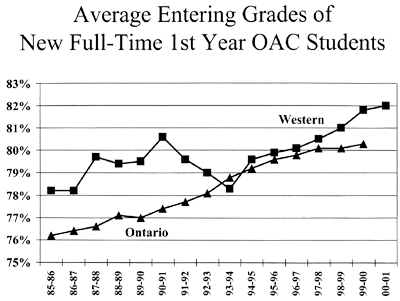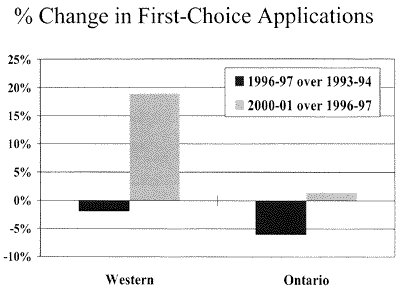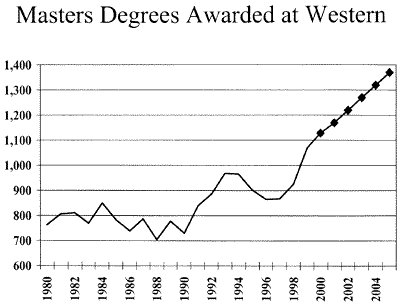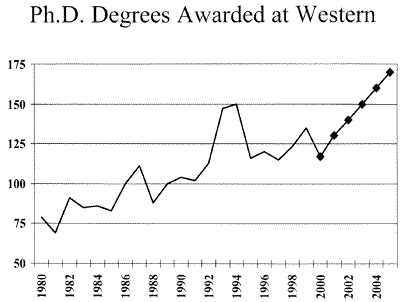VI. Students
Of central importance to the long-term health and reputation of Western is the quality of its students. To ensure the level of quality we expect of our students, we must, in turn, ensure that all Western graduates have received a strong academic and/or professional education that will successfully prepare them for leadership in their careers and communities. We must continue to educate our students to think critically, to communicate effectively, and to continue to learn throughout their lives. We must also continue to provide students with an environment in which they can grow socially as well as intellectually by providing them with opportunities to assume responsibility and leadership.
Each entering class helps spread the word to parents, prospective students, and the community at large that Western is a university sought out by those with many choices before them. Exceptional students, guided and inspired by excellent faculty, with exceptional staff support, create a unique and successful classroom experience. Outstanding students become successful, committed alumni who enhance the Western reputation and contribute as advisors, volunteers, and donors to our University’s academic mission. Recent years have seen tremendous progress in student recruitment at both the undergraduate and graduate levels.
One of the attractions of Western for undergraduate students is the residential nature of our campus and its lively intellectual life outside the classroom. Students who transfer to Western from other universities often remark on how vibrant and important campus life is at our University. We should seek to preserve and enhance the residential aspect of Western and use it in recruiting students.
At the undergraduate level, the average entering grade at Western has increased in each of the last seven years. This remarkable improvement was achieved through hard work by faculty and staff, high quality teaching, innovative programs, and implementation of many of the recommendations contained in the 1995 Strategic Plan, Leadership in Learning. The best students now see Western as a leading academic choice. Not only has the average entering grade at Western increased every year since 1994, but the rising average grade has been associated with strong growth in the number of applications. Since 1994, Western has outperformed the provincial averages in both entering grades and numbers of applicants who indicate Western as their first choice. Higher entrance standards, far from discouraging applications, have actually encouraged them, as the University becomes increasingly attractive to outstanding students from London and this region, from Ontario, Canada, and around the world. Our goal with regard to undergraduate student recruitment is to be the premier residential university in Canada.
Related Charts


Looking forward, we need to build on the academic and administrative initiatives that have proved most attractive in the recruitment and ongoing support of excellent undergraduate students. Our best students often have a particular interest in a broad and diverse education, as is evident in the remarkable growth of Western’s Scholars Electives Program. They are also eager to become involved in research. To meet these needs, we must implement creatively the recently approved reform of our undergraduate programs, which will increase both student choice and our ability to communicate to students the many academic opportunities and options available at Western.
Western is characterized by its academic mix of broad undergraduate programs in the arts and sciences, graduate programs operating at the highest level of international scholarship in a variety of disciplines and interdisciplinary areas, and some of Canada’s most distinguished professional programs, which are known throughout the country and play a vital role in overall undergraduate recruitment. Within a campus community devoted to the creation, transmittal, and application of knowledge, each of these areas reinforces and complements the scholarly activities of the others and provides a true university learning environment. In all of our programs, research and scholarly activity are at the heart of our commitment to excellence in education.
Related Charts
New Full-Time, First-Year Students Proportion from Other Canadian Provinces
New Full-time, First-Year Students Proportion of International Students
At the graduate level, Western’s enrolment has grown by nearly 30% over the last five years, which is a tribute to the quality and reputation of the research of our faculty and to the supportive environment for advanced study which they and our staff have created and maintained. This growth also recognizes the increased demand for Masters programs that provide advanced study for those seeking entry to professional practice in a variety of disciplines. Our academic plans call for a similar percentage increase in graduate enrolment over the next five years, growth amply justified by the strong applicants to our programs and the growing needs of Canadian society for Masters and PhD graduates in the academic, business, and public sectors. To meet our targets for growth, we will need to ensure that our programs are of high quality and have positive outcomes for students and that our financial support is competitive. We must also work with other Ontario universities to ensure that our Province provides full operating funding for additional graduate students and that the federal government expands its commitment to graduate scholarships. Graduate students are essential to Western’s identity as a research-intensive university, and we need to celebrate their contributions.
It is the principle of Western’s Financial Aid Office that no qualified student will be unable to attend or be required to withdraw from a program at Western for financial reasons. Since 1992-93 total student support funding has risen from $4.9 million to $28.3 million in 2001-02. Funding available for needs-based undergraduate student assistance, allocated through the University’s work/study program and direct needs-based bursaries, amounts to over $9.5 million. This is derived largely from the required 30% set-aside of revenues from tuition fee increases, supplemented by other sources, including donations and special targeted government funds. Graduate student support amounts to approximately $12.5 million in 2001-02, and is funded in large measure by the University’s commitment to allocate 75% of graduate student tuition revenue to graduate student financial support. The University continues to work with both federal and provincial governments to improve the loan systems available to students, particularly in seeking harmony and consolidation to eliminate duplication and inconsistency between the two levels. Western is also a strong advocate of an income-contingent debt reduction scheme which would consider the overall public interest in addressing the ability to repay of university graduates in subsequent years.
Our Commitments:
4. Western will strengthen its recruitment of outstanding undergraduate students and the provision of exemplary student services. Our University community will:
4.1 Provide a quality of programs and instruction which will allow us to continue the gradual upward trend of our average entering grades while meeting the enrolment targets approved by Senate;
4.2 In partnership with the Faculties and alumni, improve our recruitment efforts in areas such as high school visits and direct contact with individual prospective students;
4.3 Build on our very successful mentoring programs in student residences and at the Centre for New Students and in orientation activities organized by the University and student groups to provide support for the transition from high school to university, with special emphasis on ensuring a successful first-year experience and capitalizing on existing, excellent residence life programs;
4.4 Support and encourage the leadership and involvement of Western students in both academic and community endeavors and maintain a community supportive of student leadership, with the assistance of student organizations such as the University Students’ Council, the Society of Graduate Students, and the Master of Business Administration Association; support and encourage student involvement in community-based initiatives which draw upon their academic interests and skills, such as clinics and social assistance projects;
4.5 Invest resources selectively in recruitment of students in other provinces and countries, and ensure a campus environment supportive of diversity and welcoming to students of all ethnic, cultural and religious backgrounds, particularly, to those from Canada’s First Nations;
4.6 Expand work experience opportunities for students both on and off campus, and improve career placement services and work with alumni to help secure high placement rates for graduates.
5. Western will strengthen the quality of its undergraduate programs. Our University community will:
5.1 Carry out the reform of undergraduate programs approved by Senate for implementation in 2004; encourage Faculties and professional Schools to work cooperatively with one another and with other parts of the University in the delivery of programs and in the reform process;
5.2 Review course and program structures to support areas of academic strength, high student demand, interdisciplinary content, local community needs and concerns, reflection of city and regional diversity, the needs of the fields in which graduates will pursue their careers, and instruction which allows student participation in research;
5.3 Enhance the role of research in undergraduate teaching and bring the excitement of discovery into every classroom;
5.4 Ensure that undergraduate programs are supported by the highest possible level of library resources, information technology, classroom and laboratory facilities and staff.
6. Western will expand its graduate programs in areas of high quality. Our University community will:
6.1 Carry out the plans approved by Senate for a substantial increase in graduate enrolment over the next five years;
6.2 Develop new graduate programs in areas of research strength, with special emphasis on PhD degrees and programs in interdisciplinary areas;
6.3 Be responsive to societal need and the demands of prospective students and employers for access to advanced programs of study at the Masters level that prepare graduates for professional practice, consistent with opportunities available for placement in clinical and practicum settings within the communities we serve;
6.4 Continue to monitor the time-to-completion in our programs and take action to improve completion rates when required;
6.5 Celebrate the role of graduate students in research at Western, their contribution to undergraduate instruction, and their key role after graduation in society and the knowledge economy;
6.6 Expand the number of post-doctoral fellowships and encourage links between post-doctoral appointments, teaching, and probationary contracts;
6.7 Work to ensure full provincial operating funding for additional graduate students and an expanded federal commitment to graduate scholarships.
Related Charts
7. Western will ensure appropriate levels and means of distribution of financial assistance to students in need. Our University community will:
7.1 In all our undergraduate programs, maintain the commitment of The University of Western Ontario that no qualified student will be unable to attend Western or will be required to withdraw from any academic program at Western for financial reasons;
7.2 Maintain competitive financial support for graduate students;
7.3 Continue to develop special financial aid programs and services for students in professional programs with deregulated fees;
7.4 Construct scholarship programs which are of optimal value in the recruitment of outstanding students;
7.5 Continue to advocate increased, harmonized, fair and appropriate student loan programs at both the federal and provincial levels, including a debt reduction program available after graduation to those in greatest need.
Western’s objective to be a university of choice for outstanding faculty, staff and students will inevitably confront the severe resource limitations shared by all Ontario universities, whose budgetary revenues per student are generally below those in the rest of Canada and in the United States. Competitive student aid, and competitive salary and benefit packages, should be complemented by aggressive recruitment strategies featuring the advantages of studying, working and building a career at Western. We need to be creative and bold in finding ways to attract to Western outstanding people who will have many alternative choices and to support them within our community when they do choose Western as their academic home.
Recruitment and retention are the greatest challenges to our aspiration to continue to be a leading scholarly institution, and we consider that challenge in the sections which follow concerning faculty, staff, and students. Indispensable partners in meeting that challenge will be our 170,000 alumni. The distinguished careers of our alumni, and their feelings for Western, make them particularly effective in student recruitment. Their support of the University will be vital in securing the public and private resources necessary for faculty and staff recruitment and retention. We must actively invest in securing an effective partnership with all members of a steadily growing number of Western alumni.
The University must also engage in an active partnership with the City of London and with local businesses, organizations and agencies to work jointly in our recruitment efforts. Since our founding over a century ago, The University of Western Ontario has benefited enormously from the support of the City of London and the London community. Our positive relations with the City and its citizens is one of the defining characteristics of our institution. The economic, social and cultural advantages, the educational and health care resources, and the supportive community relations which characterize Western’s interaction with the people of London are all very positive factors in shaping an effective recruitment strategy.


